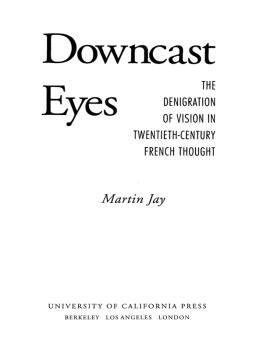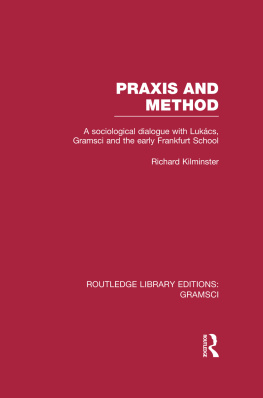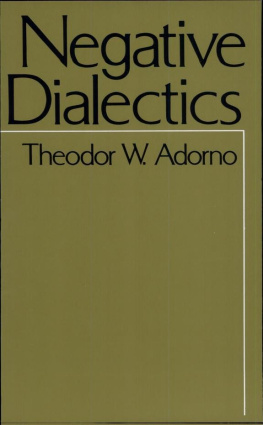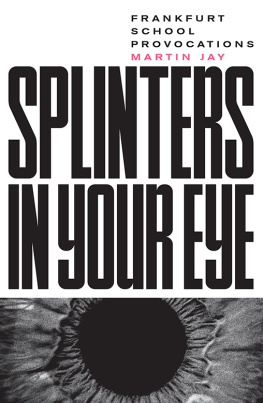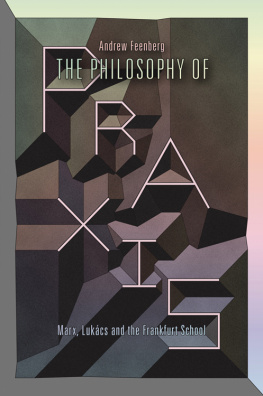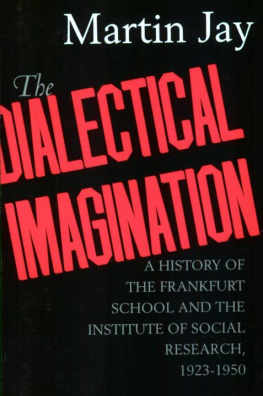THE
DIALECTICAL
IMAGINATION
THE
DIALECTICAL
IMAGINATION
A History of the Frankfurt School
and the Institute of Social Research
19231950
MARTIN JAY

University of California Press
Berkeley and Los Angeles, California
University of California Press, Ltd.
London, England
Copyright 1973 by Martin Jay
Preface copyright 1996 by Martin Jay
First California Paperback 1996
Library of Congress Cataloging-in-Publication Data
Jay, Martin, 1944
The dialectical imagination: a history of the Frankfurt School and the Institute of Social Research. 19231950 / Martin Jay.
p. cm.(Weimar and now; 10)
Originally published: Boston: Little, Brown, 1973.
Includes bibliographical references and index.
ISBN 978-0-520-20423-2 (pbk.: alk. paper)
1. Institut fr Sozialforschung (Frankfurt am Main, Germany) History. 2. Social sciencesResearchUnited States.
3. Frankfurt school of sociology. I. Title. II. Series.
H62.J37 1996 95-37290
300. 720434164dc20 CIP
PRINTED IN THE UNITED STATES OF AMERICA
The author is grateful for permission to quote from the following previously copyrighted works:
The Authoritarian Personality by T. W. Adorno et al. Quotations from pages vii, ix, 15, 18, 111, 176, 228, 359, 371, 671, 676, 747, 759 and 976. Published by Harper & Row, 1950. Reprinted by permission of the publisher.
Prisms by Theodor W. Adorno. Published by Neville Spearman Limited, 1967, London. Reprinted by permission of the publisher.
Illuminations by Walter Benjamin, edited with an introduction by Hannah Arendt. Translated by Harry Zohn. Published by Harcourt Brace Jovanovich, Inc. Copyright 1955 by Suhrkamp Verlag. Translation Copyright 1968 by Harcourt Brace Jovanovich. Reprinted by permission of the publisher.
Politics, Law and Social Change: Selected Essays of Kirchheimer edited by Frederic S. Burin and Kurt L. Shell. Quotations from pages 15, 32, 79, 86 and xvi published by Columbia University Press. Copyright 1969 by Columbia University Press. Reprinted by permission of the publisher. Material reprinted from pages 93, 99, 108, 131, 155, 1589 of this volume was originally published on pages 264289 and 456475 of Studies in Philosophy and Social Science, IX (1941), a periodical formerly published by the Institute of Social Research. These excerpts are used here by permission of the former editor of this publication, Professor Max Horkheimer.
The Intellectual Migration: Europe and America, 19301960, Donald Fleming and Bernard Bailyn, eds., Cambridge, Mass.: The Belknap Press of Harvard University Press, 1969, pages 286, 301, 325, 341, 343, 361 and 363. Reprinted by permission of the publisher.
Escape from Freedom by Erich Fromm. Published by Holt, Rinehart and Winston, Inc., New York. Published as The Fear of Freedom by Routledge and Kegan Paul Ltd., London, 1942. Copyright 1941 1969 by Erich Fromm. Reprinted by permission of the publishers.
Dmmerung by Max Horkheimer under the pseudonym Heinrich Regius. Published by Oprecht and Helbling in Zurich, Switzerland in 1934. Reprinted by permission of the author.
The Eclipse of Reason by Max Horkheimer. Published by Oxford University Press. Copyright 1947 by Oxford University Press. Reprinted by permission of the publisher.
Literature and the Image of Man by Leo Lowenthal. Published by Beacon Press. Copyright 1957 by Leo Lowenthal. Reprinted by permission of the publisher.
Eros and Civilization by Herbert Marcuse. Published by Beacon Press. Copyright 1955 by the Beacon Press. Reprinted by permission of the publisher.
Negations by Herbert Marcuse. Published by Beacon Press. Copyright 1968 by Herbert Marcuse. Reprinted by permission of the publisher.
Reason and Revolution by Herbert Marcuse. Published by Beacon Press. Copyright 1941 by Oxford University Press, New York, Inc. Second edition Copyright 1954 by Humanities Press, Inc. Preface, A Note on Dialectic Copyright 1960 by Herbert Marcuse. Reprinted by permission of Humanities Press, Inc.
Behemoth by Franz Neumann. Published by Octagon Books, a sub-division of Farrar, Straus & Giroux, Inc. Copyright 1942, 1944 by Oxford University Press, New York, Inc. Reprinted by permission of the publisher.
The Democratic and the Authoritarian State by Franz Neumann. Published by The Macmillan Company. Copyright 1957 by The Free Press, a Corporation. Reprinted by permission of the publisher.
A portion of the second chapter of this volume has appeared in The Unknown Dimension: European Marxism since Lenin, edited by Dick Howard and Karl Klare. Published by Basic Books. Copyright 1972 by Basic Books. It is reprinted here by permission of the publisher.
Printed in the United States of America
12 11 10 09 08
12 11 10 9 8
The paper used in this publication is both acid-free and totally chlorine-free (TCF). It meets the minimum requirements of ANSI/NISO Z39.48-1992 (R 1997) (Permanence of Paper). 
To my parents,
Edward and Sari Jay
Contents
Preface to the 1996 Edition
I arrived in Berkeley for the first time in August 1968, a twenty-four year old graduate student, invited by Leo Lowenthal to examine his extensive personal archive of materials from the Institute of Social Research. As I spent long hours poring over years of letters and unpublished manuscripts, amassing questions about figures, events and ideas that Lowenthal patiently answered, the world outside was convulsed by a series of cataclysmic events. On the 21st of August, tanks from the Soviet Union and its allies rumbled into Prague, violently ending the experiment in Marxism with a Human Face that had so captivated the imaginations of non-doctrinaire leftists earlier that year. Only a few days later as the whole world was watching, the Democratic convention in Chicago was disrupted by protestors enraged by both President Johnsons policies in Vietnam and the likelihood that the partys nominee, Hubert Humphrey, would continue his predecessors sorry course.
On the daily walk from my apartment to Lowenthals office, I passed the forlorn, now empty Berkeley campaign headquarters of Robert Kennedy, whose assassination two months earlier had meant the end for many of the hopes that fundamental change might come, in the catch-phrase of the time, by working within the system. The Berkeley campus was itself a site for escalating confrontations between students and authorities egged on by a state administration headed by then Governor Ronald Reagan. In the surrounding community, the Black Panther Party was an insistent presence, bearing witness to the still volatile racial tensions that had exploded into ghetto riots after the murder of Martin Luther King, Jr. that spring.
The pressure of these circumstances was impossible to ignore as I made my way through the treasure trove of documents Lowenthal generously put at my disposal. The Frankfurt School had just begun to emerge into public consciousness as a theoretical inspirationstill, to be sure, only dimly understoodof the New Left here and abroad. Its impact was, in fact, now spreading well beyond the confines of academia. When I arrived in Berkeley, one of the main protagonists in the story I hoped to tell, Herbert Marcuse, was in hiding from death threats in Lowenthals summer home in Carmel Valley. Only a few months before, during the events of May in Paris, student
Next page

